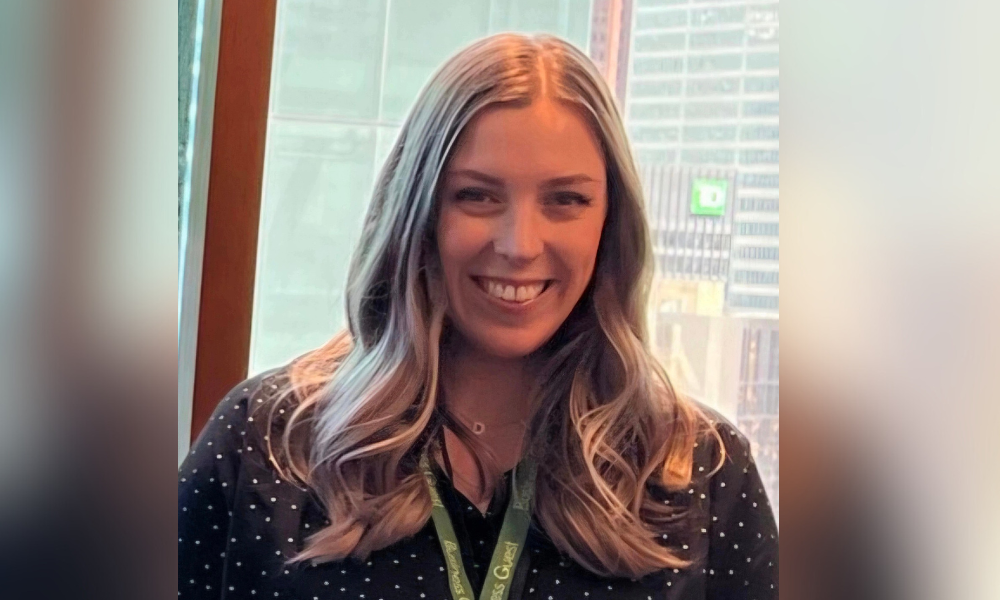
HR leader discusses importance of balancing empathy, tech and organizational change

“Sometimes we spend more time at work than we do at home with our families, and it's important that the workplace is safe and welcoming and accessible for everyone and makes everyone feel supported, and that everyone has a positive experience.”
So says Samara Cazes, People and Engagement Operations Manager at Nelson Education, who adds that creating an environment where employees feel supported and have a positive experience is at the heart of her HR philosophy.
“I've always had a little bit of a knack for business; I knew that I would be good with it. I have two parents who were both small business owners,” she adds. “One of my strengths that I noticed growing up was being able to work well with all different kinds of people, people from all different walks of life, all different generations.”
Cazes’ fascination with human behaviour and desire to motivate and engage people at work quickly became central to her career path. Though she hadn’t initially envisioned a career in HR, once she discovered it, she “completely fell in love with it,” Cazes told HRD Canada.
Before finding her footing in HR, Cazes worked in various administrative and customer service roles in the municipal public service environment, where she was exposed to the inner workings of different teams and leaders. During this time, she became captivated by the relationships between managers, executives, and employees.
“I just became really fascinated with the dynamics between managers and employees, executives and employees, working with Mayor and Council,” Cazes says. “And I just found the whole thing so incredibly interesting.”
This passion for understanding how organizations function led her to pursue an HR certificate and her CHRP designation while working full-time for the city—leading to her first roles in HR and the journey to where she is now, leading initiatives and strategies at Canadian education content provider Nelson.
Describing herself as an “elder millennial,” Cazes has a deep appreciation for the role technology currently plays in improving HR processes, and the challenges of bringing tech to legacy employees and processes.
She recalls how, in her role with municipal government, she witnessed the challenges of implementing new technological systems. “A lot of people, they really just threw their hands up and were like, ‘This is too much. I don't want to learn this. I’m too old,’” she says.
To Cazes, the key to overcoming resistance to change is proper engagement and communication; she explains that if stakeholders are involved early and understand the purpose of new technology, they are more likely to embrace it.
“If we really just took a little bit extra time to engage those stakeholders and engage those legacy team members and what we were doing and why we were doing it, I think they would have had a much more positive embrace of that change,” she explains.
“In my role at Nelson, and in my previous role as well at [BeMo Academic Consulting] when I was there leading their HR team for four years, we implemented a lot of different technology and a lot of efficiencies,” she says.
At Nelson, Cazes has been instrumental in implementing operational efficiencies through new technologies, particularly HR systems; despite the challenges that come with training team members and managers, Cazes sees technology as an essential tool for making HR operations smoother.
“Is there a learning curve? Yes. Is it tough sometimes, to train other team members and managers on a new system? Absolutely. But in my opinion, technology is something that we should use as a tool to our advantage, and to really make things smoother and better for all of us at work. … I have really found technology to be my friend and not my foe, and I think with proper change management techniques, everybody can find it in the same way, and find that it improves their work—and sometimes their life—but definitely their work.”
Over the past year, Cazes and her team at Nelson have been focused on managing significant changes, including the rollout of several new HR programs. Although the programs are based on feedback, the simple number of new strategies present challenges, she shares.
These changes include a new performance management program, a learning management system, and new compensation banding. “It's a lot to throw at employees and managers.”
Managing the change and getting everyone on board has been a challenge, but Cazes is optimistic about the outcomes.
“It’s really exciting because there’s so much great stuff that we’re doing. We’re already seeing incredible outcomes from all of it.”
Cazes credits her success in managing change to clear and repetitive communication, a strategy she has adopted from marketing and product development practices.
“A big thing that we’ve been really focusing on is multiple different forms of communication, but very repetitive and clear information,” she says. “I am one of those people who believes that ‘clarity is kindness.’ Kindness is clarity.”
As much as Cazes prioritizes strategic thinking and operational efficiencies, she also believes in the power of humour and humility in HR leadership.
Her advice for other HR leaders? “Don’t nitpick yourself into oblivion.”
“What I’ve really learned is that the most important thing above all is to have a good sense of humour,” she says. “This is a very, very tough job, a lot of responsibility, and we’re under a lot of pressure a lot of the time. You have to be able to laugh at yourself. You have to be able to be humble, to let things roll off your shoulders, to just live and learn and do better next time.”